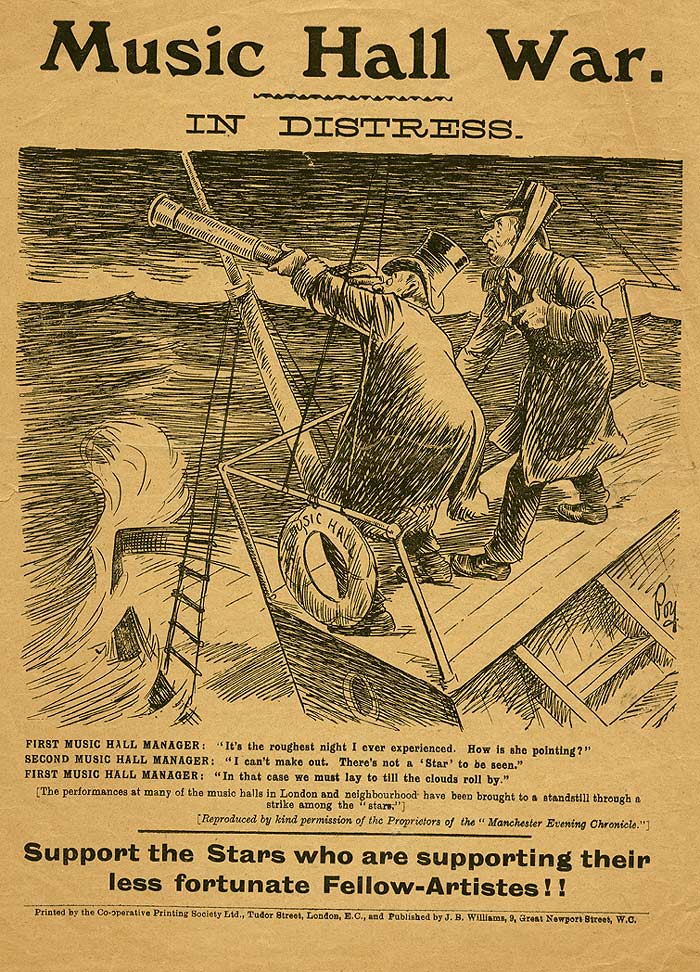The Music Hall War of 1907 was an industrial dispute between music-hall employees, stage artistes and London theatre proprietors. The catalysts were poor pay and working conditions, increased working hours, and the extra work imposed by matinée performances.
The strike began on 22 January 1907 at the Holborn Empire in London. It gathered momentum owing to the support from popular entertainers including Marie Dainton, Marie Lloyd, Arthur Roberts, Joe Elvin and Gus Elen,[1] all of whom were active on picket lines outside London and provincial theatres.
The strike lasted for two almost weeks, and resulted in improved pay and working conditions for stage workers and artistes.[2]
Pre-strike years
By 1875 there were 375 music halls in London,[3] and a further 384 in the rest of England. In London, and to capitalise on the increasing public demand, some entertainers frequently appeared at several halls each night.[4]
In 1898 Oswald Stoll became the managing director of Moss Empires, a theatre chain led by Edward Moss, which had bought up many of the English music halls and begun to dominate the business.[4] Stoll became notorious among his employees for implementing a strict work environment with poor pay.[5]
At the turn of the 20th century music hall artistes had been in an unofficial dispute with theatre managers over poor pay and working conditions, and a dramatic increase in the number of matinée performances.[6] By 1903 audience numbers were falling, which was attributed in part to the banning of alcohol in auditoriums and the introduction of the more popular variety-show format favoured by Stoll. Profits for the music-hall proprietors who had not sold to Moss Empires came under pressure, and so they banded together to control their outgoings.[7]
Strike and resolution
The first significant rift came in 1906,[6] when the Variety Artistes’ Federation initiated a brief strike on behalf of its members.[8] Tensions between employees and management had by then grown to such a level that the strike was advocated enthusiastically by the main spokesmen for the trade union and Labour movement – Ben Tillett and Keir Hardie. Picket lines were organised into shifts outside theatres by workers and artistes. The news reached provincial theatres, and managers attempted to convince their artistes to sign a contract promising never to join a trade union.[9] The following year, the federation fought for more freedom and better working conditions on behalf of music-hall performers.[10]
By 21 January 1907 the dispute between artists, stage hands and managers of the Holborn Empire had worsened, and strike action was called for. In support, other theatrical workers followed suit and widespread strikes across London followed;[1] the disputes were funded by wealthy performers including Marie Lloyd.[11][12] To raise spirits, Lloyd frequently performed on picket lines for free, and took part in fundraising activities at among others the Scala Theatre in London, for which she donated her entire fee to the fund.[13] Lloyd explained her advocacy: “We the stars can dictate our own terms. We are fighting not for ourselves, but for the poorer members of the profession, earning thirty shillings to £3 a week. For this they have to do double turns, and now matinées have been added as well. These poor things have been compelled to submit to unfair terms of employment, and I mean to back up the federation in whatever steps are taken.”[14]
The strike lasted for almost two weeks. It ended in arbitration, which satisfied most of the strikers’ main demands, including a minimum wage and a maximum working week for performers.[2]

